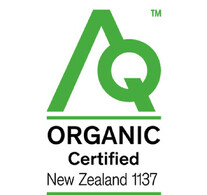What is organic milk powder?
Organic milk powder comes from raw, organic milk. In order to be recognised as organic, farmers need to operate using internationally recognised organic farming practices. The farm and its milk must meet very specific organic production standards to gain Organic Certification and cannot claim to be organic without that certification. Organic processed food generally only contains organic ingredients. Food irradiation, industrial solvents, and chemical food additives are banned when processing organic food. In some cases where non-organic ingredients are used, they are strictly limited in the product’s total percent, generally to within 5% or less.
While each country has its own organic rules, the principles of organic farming and production of raw materials fits within very specific standards, globally.
What about claims that organic milk contains no pesticides, antibiotics or hormones?
In order to gain organic certification the farm aiming to produce organic milk must convert its farming practices to fit within strict organic requirements. For example, any use of synthetic pesticides and chemical fertilisers is not permitted, although in some cases the use of organically approved pesticides may be permitted within controlled conditions. When undertaking dairy farm conversion from standard milk production to organic milk production, the farmer must assess current farming methods and modify these to where the introduced alternatives minimise environmental impact and promote better animal welfare without the use of chemicals.
Does organic milk taste better?
The knowledge that organic milk is free of pesticides and chemicals must improve the taste, surely? And while the debate is still continuing as to whether organic milk tastes better, here at AwaRua Organics we believe the fact that our milk comes from some of the cleanest, remote places in the world, where cows soak up the sun and dine on lush pastures, has to enhance the taste. It certainly is creamier.
Seasonally though there can be slight variances in its taste, just as there can be from the herb supplying the milk, where they are farmed and whether they’ve had an extra helping of hay or similar food treats. Why not taste it to see what you think?
Is organic milk fresher than regular milk?
That really depends on the milk supply, when it is picked up from the farm and when it is processed. Generally as New Zealand is a small country, the distances between the farm and the processing plant are not that far away and the milk is processed within hours of being picked up, whether it is organic or standard milk. The advantage with organic milk powder is you control its freshness by only making it up as required.
Why does organic milk cost more than other milk?
Producing organic milk is generally more labour intensive with considerably more checks in place to ensure farmers meet the requirements within their organic certification. The initial cost of converting a farm to organics is also costly. But once farmers have reached organic certification their milk is recognised as a premium product due to its production processes and its healthier, chemical free status.
What are the benefits of "grass-fed"?
Milk from grass fed cows is rich in Vitamin A and Vitamin E and contains more CLA (Conjugated Linoleic Acid) when compared to milk from cows who eat an unnatural diet of grains.
What is the normal taste of the product?
AwaRua Organic milk powder has a rich, creamy taste with a smooth feel in your mouth. That creaminess comes from our pasture-fed cows. Sometimes other organic milk powder brands are produced from cows fed mainly on dry food and housed in barns rather than allowed to roam the pasture and forage. This type of farming can affect how the milk tastes.
To give you the best nutrition for your family some of our organic milk products contain DHA.ARA, a synthetic version of fatty acid which makes the product as close to human breast milk as possible. Think of it as added goodness.
Why is there a difference in the colour of the milk powder and its humidity?
Depending on the way milk powder is processed, batches can vary in colour and in their humidity. Other factors that can alter milk powder colour and humidity are the time from processing until use and the climate where it is available. This slight variance in its colour and humidity are perfectly normal.
What is the recommended temperature to prepare the milk powder?
We recommend that you use a water temperature of between 40°C – 60°C to prepare the milk otherwise it will take longer for the milk powder to dissolve. If the water temperature is too hot, lumps of milk powder may form. It’s best to drink your milk warm or at room temperature otherwise you may get an upset stomach.
How do I store the milk powder?
Milk powder should be stored in its original container in a cool, dry place. Please check the use by date and consume it within that time period.
Why there are bubbles when I make up the milk powder?
Like most things in life milk powder contains air. When you dissolve the milk powder the air creates bubbles. This is quite normal and harmless. Some products that are dissolved in water contain chemicals to suppress the bubbles. Our milk powder doesn’t.
Why are there sometimes tiny particles presented in the milk after it is dissolved?
To give you the best nutrition, our milk powder has been enriched with various nutrients. When you dissolve the milk powder some of the tiny particles of those nutrients can still be seen. Also, if you prepare the milk powder then leave it to sit for a while you may find minerals that naturally occur in milk will appear. It is quite safe to drink the milk even if tiny particles appear.
What are the water-insoluble black spots in the milk powder?
Milk powder is processed using high temperatures and occasionally the protein and lactose in the milk can overheat which causes small black or brown spots. We rigorously test our milk powder to make sure these spots have no harmful effects. You can rest easy in the knowledge that your milk powder is safe to consume.
Why is New Zealand milk so good?
New Zealand is largely unspoilt with few cities and miles and miles on prime land, and it really is one of the few places on the globe with the perfect climate to raise grass fed cows that graze year-round outside on lush pastures. We believe our cows are happy and healthy and therefore produce a more nutritious milk.





